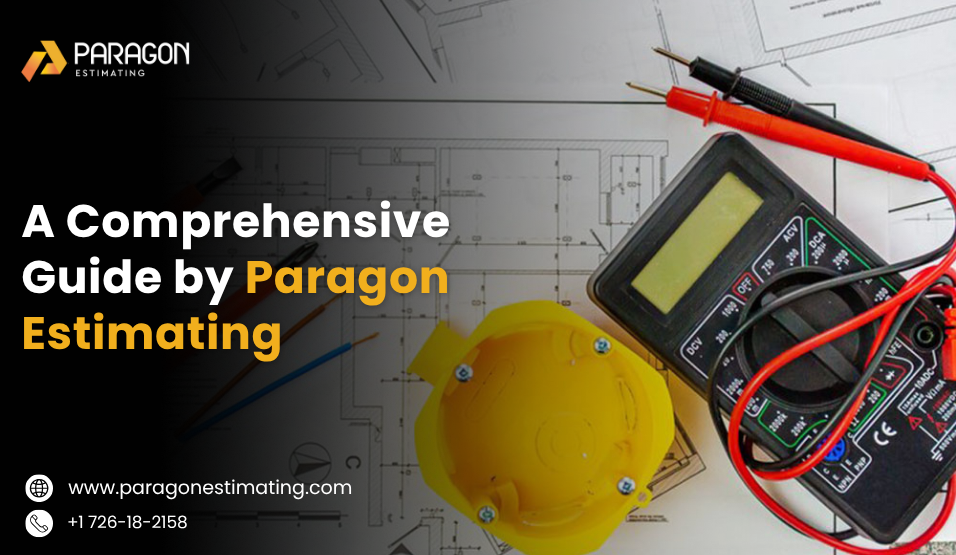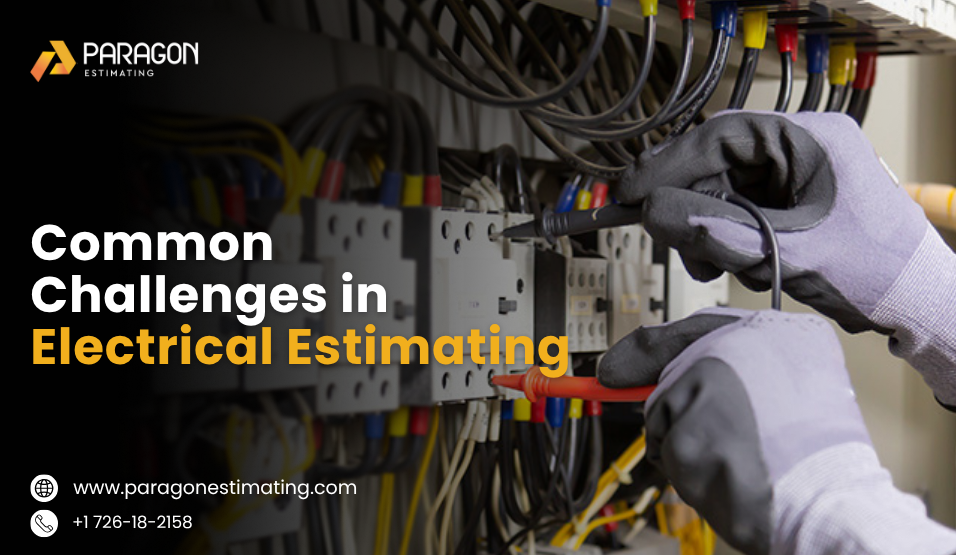A Comprehensive Guide by Paragon Estimating
For building projects, this typically involves either brand-new construction or the remodelling of a home or commercial building. The various components require estimates of cost and technical considerations. Knowing how to Estimate Electrical Work can reduce time, cost, and hassles, while making sure the electrical system you install is safe and is in line with the most recent standards.
Paragon Estimating. We are a specialist in providing accurate and comprehensive estimates of the electrical cost for all types of projects. Our team is aware of the intricacies of Estimating Electrical Work and will assist you with each step of the process.

What is estimating electrical Work?
Before we begin the procedure of estimating electrical Work, it is essential to understand the definition of electrical work estimation. The essence of electrical estimation is to calculate costs associated with the installation, maintenance, or repair of electric systems. This can comprise everything from lighting to wiring to power outlets, as well as more intricate electrical systems for commercial use.
Importance of Electrical Estimating
Estimating electrical Work power is an essential role in planning a project, since it helps ensure that both contractors and customers are informed about the extent of the project as well as the cost. Accurate electrical estimation can help:
- Beware of Cost Overruns: By taking into consideration all aspects of your system, from the components to the labor, you can reduce the cost of unexpected expenditures.
- Be within budget: Estimating can ensure that electrical work can finish within the budgetary limit established by the company responsible for this project.
- Develop a Strategy Effectively: Knowing the supplies you need and how to work ahead helps you plan the work you will do and also organize your materials.
Key Factors to Consider When Estimating Electrical Work
The method of estimating electrical power requires an in-depth review of the various factors that impact the process of estimation. Here’s an outline of the most significant elements to consider:
1. Type of Electrical Work
The function of electrical wiring is contingent on the type of work. For instance, electrical work for residential uses differs from commercial or industrial. The extent of the wiring system, the type of wiring, and the specific requirements of the home can affect the price estimate.
2. Size of the Project
Larger projects, such as the construction of new structures or an enormous electrical work overhaul, generally require more detailed designs, a larger amount of resources, and more people. The size of the project will greatly affect the duration of time required and also the cost of electrical services.
3. Materials Needed
The essential components to conduct electrical work include conduits, electrical boxes for wiring outlets, electrical switches, and others. The kind of material you select (standard or expensive, for instance) will have an effect on the overall cost. Prices can also vary according to the state of the market, as well as where you reside.
4. Labor Costs
The cost of labor is typically one of the largest elements of an estimating electrical Work costs. Highly skilled electricians must complete many tasks, such as installing wiring and troubleshooting, as well as making sure that safety regulations are followed. Costs for labour can vary depending on the number of employees, the degree of the job, and the hourly wage rate for the region.
5. Time Frame
The length of time needed for an electrician to complete his work will impact the cost. The shorter durations could require more workers or longer hours, which could result in a higher cost for labour. However, the longer timeframe of a project can result in a reduction in labor costs, but the waste of materials may be produced.
Methods for Estimating Electrical Work
Once we’ve identified the essential elements to take into consideration, let’s look at the most well-known methods for how to estimate electrical activity. According to the nature of the estimating electrical Work, the method chosen may be more effective than another. Here are the most popular methods:
1. Unit Pricing Method
The unit pricing method involves pricing each component of the electrical system separately. For instance, you can determine the cost per foot of cable, or the cost per outlet or the cost for a luminaire. This approach is best for projects where the scope is clear and the project is being carried out routinely.
2. Labor Hours Method
This method is based on estimating the total hours required for estimating electrical Work. This involves taking the time needed for each job and then multiplying this by the hourly rate of the electrician.
3. Material-Based Estimating
In estimating based upon materials, it is important to separate the electrical system into the components required (wires, junction boxes, switches, etc. ). Calculate the amount needed to be used, then calculate the cost of these items.
4. Detailed Takeoff Method
The procedure of starting off in full involves a thorough study of the entire electric network. This process involves the calculation of the number of outlets along with lighting and wiring, and the dimensions of electrical panels needed.
How to Estimate Electrical Work for a Residential Project
Estimating electrical work power in residential homes is usually less complicated than commercial or industrial projects. However, it does require diligence and accuracy. This is an easy step-by-step process:
Step 1: List All Electrical Fixtures
Begin by naming each electrical fixture or component to be installed, such as outlets, switches, lights, Smoke detectors, and electrical panels.
Step 2: Measure the Area
Find the location where electrical wiring will be placed. For instance, in the case of lighting, figure out the quantity of fixtures that you’ll require for each room, and the wiring.
Step 3: Calculate Materials and Labor
Based on the methodology you like (unit pricing hourly labor, hours of work, or based on materials), calculate the amount of the materials needed and estimate the time it will take to finish. For each element, estimate the total number of wires, electrical boxes, and other equipment you’ll require.
Step 4: Consider the Local Codes and Permits
Verify that your estimate includes the cost of permits and inspections, as required by local electrical codes.
Step 5: Factor in Overhead and Contingency
Make sure you include the overhead cost and allow for any unexpected costs that could be incurred in the course of this process.
Common Challenges in Electrical Estimating
When it comes to the process of estimating electrical work, there are numerous problems that can arise. The most frequent issues are:
- Incorrect Measurements: If the measurements aren’t precise, the estimate of costs may be incorrect and result in either over- or undercharging.
- Market Rhythms: The price of raw materials can fluctuate, so estimates could need adjustments.
- Unexpected Issues: Hidden issues like defective wiring or electrical panels that are not functioning properly can increase the repair costs.
- Amendments of Scope: If the scope of your project shifts, it may alter the estimates you made originally and cause delays.

Why Choose Paragon Estimating for Your Electrical Work Estimating Needs?
Paragon Estimating, we pride ourselves on offering accurate, reliable, and comprehensive How to Estimate Electrical Work that aids you in avoiding costly mistakes and provides a smooth flow of your work. Our expert team uses modern methods and deep knowledge to provide you with the most precise and cost-effective estimates, regardless of whether you’re managing a tiny home improvement project or a large commercial project.
Are you eager to receive a professional cost estimate for the electrical Work you want to do? Call Paragon Estimating now, and let us take away the pressure on the electrical work you are planning!
FAQs
Which is the more well-known way of estimating the electrical power required?
The most popular methods are cost per unit hours of labor, unit price, and estimates based on materials. Each has advantages, dependent on the particular requirements of the project.
How can I tell whether my estimate of electrical power is correct?
A careful takeoff with precise measurements, as well as a thorough understanding of the work’s scope, will assure that the estimation you make is as exact as it is possible to be.
What are the major factors that determine the cost of electrical projects?
It is the type of job (residential or commercial) and the material used, the cost of labor, duration of the project, as well as local regulations, that can all affect the cost of electrical projects.
Does Paragon Estimating help with both residential and commercial projects?
It’s true! We are experts in commercial and residential estimating electrical Work, and we will ensure that your project is on time and within budget.
What time does it take to receive the estimate of electrical costs?
The length of time required is dependent on the complexity involved in the job. In general, the case of estimating a precise timeframe could range from a couple of days to a whole week.


